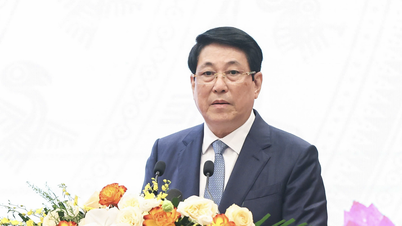
Candidates taking the high school graduation exam at the exam site of Pham Van Chieu Secondary School - Photo: HO NHUONG
Are we witnessing a contradiction within the education system itself, or is this a sign of unprecedented competition?
Why the high benchmark?
At first hearing, "difficult questions, high scores" is a paradox. Normally, the more difficult the questions, the lower the average score, leading to a lower benchmark. Were the initial assessments of the difficulty of the questions wrong, or have the students' abilities improved dramatically?
In fact, this is just a "superficial paradox". The high benchmark scores do not reflect the overall average, but mainly come from the focus on competition among the top candidates. Outstanding candidates can still achieve very high scores, enough to fill the limited quota of hot majors, thereby pushing the benchmark scores to record levels.
The college entrance exam is like a long-distance race that can be full of obstacles, but the best athletes still finish with impressive results.
The benchmark actually only determines who finishes in 1,000th or 2,000th place. Even though many other candidates have "fallen behind", the person at that mark still has to achieve very high results to be selected.
Therefore, the increase in benchmark scores is an inevitable consequence of the fierce screening mechanism in hot majors, top schools, where job opportunities are high or enrollment quotas are limited, not necessarily due to easy or difficult questions.
The current admission picture is complicated by the parallel existence of many methods: reviewing academic records, competency assessment exams, or combining international language certificates. Each method has its own formula.
The IELTS certificate, for example, is only converted by the Ministry of Education and Training into a foreign language score in the graduation exam (on a scale of 10). When considering university admission, this score and two other subjects add up to a maximum total of 30 points.
Some schools calculate IELTS 6.5 as 10 foreign language points and add them to the combination to get a total of 25 points, but other schools calculate or add priorities to get 27 - 28 points. That difference causes a candidate with a high score to fail, while others, thanks to choosing the right method, get priority, and get admitted.
This raises questions about fairness. In theory, schools publicly disclose their admission plans and scoring formulas. But in reality, the diversity and complexity of the process makes it a "matrix" where only those who know the rules of the game have an advantage. Students in urban areas, with access to information, can easily optimize their choices.
On the contrary, students in remote areas lack information and are easily at a disadvantage. As a result, admission is no longer simply a matter of "whoever is better will pass", but sometimes it is "more luck than intelligence".
Worrying
From a social perspective, this phenomenon raises concerns: are we creating an education system that is biased towards training "exam takers" rather than well-rounded individuals?
The pressure to pursue scores, aspirations, and priorities makes students and parents confused, tired, and even lose faith. If not adjusted, this situation can easily lead to distortion of educational goals: instead of nurturing passion and creativity, students are forced to calculate exam strategies.
What is the solution? First of all, the Ministry of Education and Training needs to come up with a unified conversion framework at the national level to limit the situation where each school has its own model. Schools must be transparent and simplify the admission formula so that candidates can easily understand it.
At the same time, the career counseling system needs to be expanded, especially for students in disadvantaged areas.
More importantly, society and families should change their mindset: not only hot majors are the path to success, but also need to encourage students to pursue their abilities and interests.
Towards fairness in admissions
The paradox of "difficult questions, high scores" reflects the increasingly concentrated competition among excellent candidates of hot majors and top schools, along with the confusion in the admission method. But looking at it more broadly, failing to get into university today is very difficult because the quota is large, so fierce competition is only true in some specific majors and schools.
To solve the problem at its root, we cannot just adjust each exam, but need comprehensive reform: standardizing conversion, making information transparent, diversifying assessments and reorienting educational goals. Only then can we build a more fair, effective and humane admission system.
Source: https://tuoitre.vn/nghich-ly-tuyen-sinh-de-kho-nhung-diem-chuan-cao-20250824102503684.htm











































































































Comment (0)